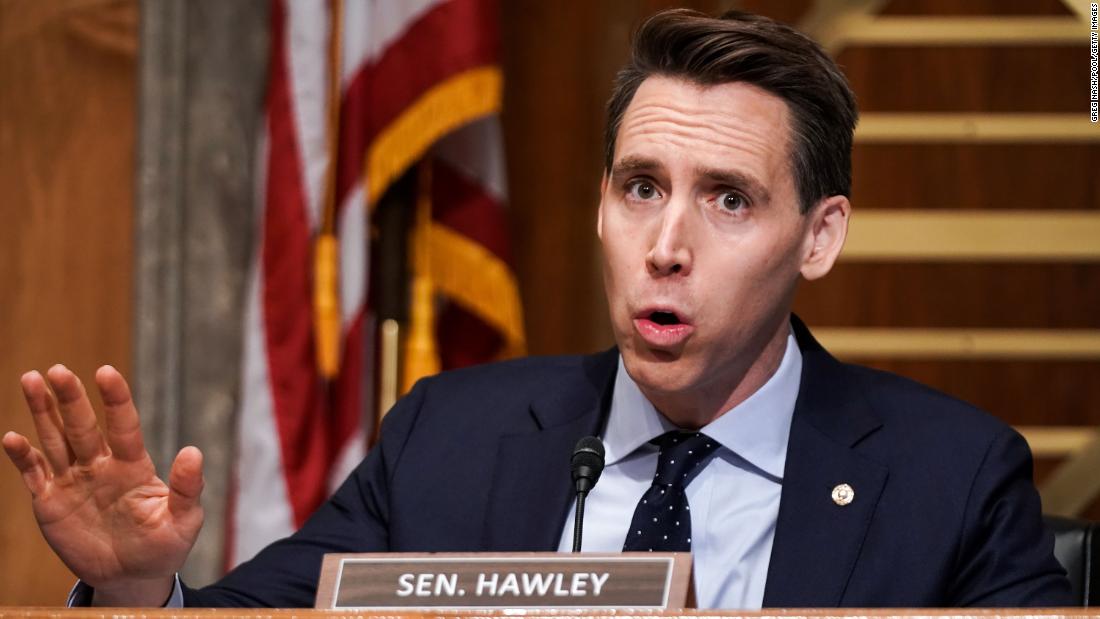But Hawley said he “doesn’t” regret it, telling CNN, “I was very clear from the start that I was never trying to overturn the election.”
However, before January 6, Hawley did not rule out the possibility that Congress could rule out election results and keep Trump in office. On January 4, Hawley was asked by Fox News: “Are you trying to say that from January 20, President Trump will be president?” He replied to anchor Bret Baier: “Well, Bret, it depends on what happens on Wednesday. I mean, that’s why we have the debate. That’s why we have the votes.” Hawley has repeatedly refused to say that Congress would not be able to change the results of Biden’s victory.
On Thursday, CNN lobbied Hawley about the discrepancy between his claim that he never tried to overturn the election and his January 4 comments that Trump could still be president, depending “on what happens” on January 6 and his refusing to dismiss Congress could change the outcome. Hawley said he has been consistent in the fact that January 6 was the last day of the electoral process, arguing that his only intention behind the objection was to spark the debate over Pennsylvania’s voting system.
“I told (Baier) what I said consistently … For me, January 6 is the end of this process, it is when the votes are counted, certified, the winner of the election under the Constitution is officially declared,” said Hawley. “For me it’s the end of the line.”
Nor did Hawley say whether he should have responded to Baier differently and responded with the precise statement: that Biden would be the next president because there was never a chance that Congress would overturn the result. He said his words would have been distorted, no matter what.
“I think the liberal attack of lies to distort, misinterpret and attack me, no matter what I say or do, they will tell the lies no matter what,” said Hawley as he walked down the Capitol corridors. “They will say that you wanted to overturn the election, they will say that you incited violence, all of this is a lie.”
Hawley’s January 6 objection was significant because Congress can reject electoral votes if at least one member of the House and a senator object to a state’s results, followed by majority votes in both houses. With large bipartisan majorities opposing Congressional efforts to discard electoral results from any state, Hawley’s move was bound to fail.
But after he became the first senator to announce that he would object, Hawley effectively gave hope to pro-Trump activists and fervent supporters that the defeated Republican president could still retain power, a far-fetched idea that the then president actively promoted.
Hawley insisted on Thursday that he was simply trying to start a debate about voting for “irregularities” in Pennsylvania – and not changing the outcome.
“It is crystal clear what my intentions were and what I hoped to achieve, which is to draw attention to what happened in Pennsylvania and other irregularities and try to force some Congressional action, some debate,” said Hawley. “I opposed this state for that reason, and it was me representing my voters.”
In his December 30 announcement that he would object to the election results, Hawley did not say his aim was to annul the election. But he also did not mention that his effort would not change the victory of the Biden Electoral College.
This time, Trump mounted a months-long campaign to discredit the elections, repeating lies and conspiracies that the election was “rigged” and “stolen” while promoting the January 6 rally before the joint session of Congress met to account for the results. – everyone who led to the deadly riot at the Capitol that day.
Asked whether his actions perpetuated the lie that the election was stolen, Hawley stepped back.
“I never used that rhetoric and I was very clear about the reason for my objection and what I was doing,” said Hawley. “So, absolutely not.”
Hawley, who is often seen as a possible presidential candidate in 2024, insists that “I will not” run for the next presidential election. And facing an ethics complaint in the Senate, Hawley says he has yet to hear the committee’s investigators (he filed a counter complaint this week against Democrats, who he accused of abusing the process unfairly by targeting him).
Last week, Hawley called Trump’s comments on January 6 for the rally “inflammatory. I think they were irresponsible. I think they were wrong.” And after the protesters ransacked the Capitol, he condemned the violence and the rebels while arguing that the proper way to challenge was in the halls of Congress.
However, despite calls from his colleagues to drop his objection and show unity after deadly violence, Hawley still opposed the Pennsylvania results, which failed completely in the Senate, 7-92. Hawley also voted for Cruz’s challenge to Arizona’s results, an attempt that was rejected by a 6-93 vote.
“These are not messages,” said Hawley when asked if he should have changed his own rhetoric before 6 January. “This is an attempt to silence political opponents. This is a blatant attempt to end the democratic debate.”
Aaron Pellish and Marshall Cohen of CNN contributed to this report.
